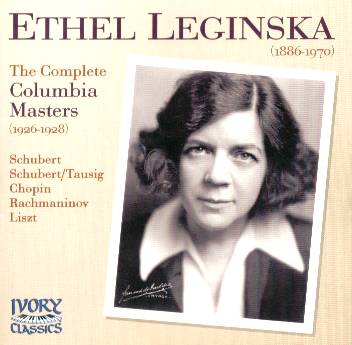Leginska’s name has always been more honoured in the
breach. A notable propagandist for women musicians – she was a composer
and a conductor as well as a pianist – her reputation suffered inevitable
decline, one exacerbated by the relative paucity of her recordings.
The fact is that she had a most distinguished pedigree; a Leschetizky
pupil until she was sixteen, studies in Berlin, a performance of the
Henselt Concerto with Henry Wood whilst still in her mid-teens. Following
her (failed) marriage she went to America where she continued to study
– theory with Rubin Goldmark and composition with Ernest Bloch (three
operas of hers, Gale, The Rose and the Ring and Joan
of Arc, were written in the 1930s – she seems also to have excelled
at orchestral works). Like Iturbi shortly after her, conducting became
a passion and at thirty-seven she studied its technicalities with Robert
Heger and Eugene Goossens (an old friend) and in time became known as
one of the first major women conductors with a string of prestigious
engagements. She conducted – opera as well as orchestral concerts –
in London, Salzburg, New York and Boston. In 1932-33 she was conductor
of the Montreal Opera Company.
Leginska was born Ethel Liggins in Hull in 1886. It
was the snobbish Lady Maud Warrender who suggested the Slavic name to
enhance her career though she was hardly unique in feeling that an English
name was a hindrance to wider acceptability, not least in her own country.
She was one of the most interesting and picaresque of British pianists
born between Harold Bauer (b.1873) and Myra Hess (b.1890) – though one
arguably less talented than her now little known contemporary, the superb
Winifred Christie (b.1882). Like Bauer and Hess she gravitated fairly
early to America (Hess was appreciated early in America; her iconic
status in British musical life was not as secure as it now retrospectively
seems always to have been). This is apparently the first time that her
American Columbias, recorded in New York, have been reissued en bloc
and they disclose a musician of distinct and considerable - though not
unproblematic – gifts; sensitive, tonally splendid, with a command of
phraseology that is frequently compelling.
Schubert, Chopin, Rachmaninov and Liszt are the four
composers represented on these early electrics. The Four Impromptus
date from 1928 and were issued as Set No. 93. The B flat major embodies
a genuine nobility – albeit in a rather deadpan sort of way – but the
concluding F minor (No. 4 – Allegro scherzando) generates its
own internal momentum and is full of contrast, both colouristic and
in terms of depth of sound. The Six Moments Musicaux, together with
the Impromptus, represent her primary contribution to the discography
but are uneven. The first is full of fluency and tonal sagacity with
strong architectural wisdom but the second, in A flat major, is rather
earthbound with hints of metricality. The little F minor makes little
impression in her performance but the C sharp minor is a fine reading
– sonority, span and phrasing held in excellent equilibrium and no sign
of any sectionality in a piece that can tend to buckle in less perspicacious
hands. She is quite emphatic in the F minor (No. 5) and cultivates a
rather rugged view of the concluding Allegretto though not one without
interest. I was less taken by the Schubert-Tausig; rather finicky phrasing
to my ears – italicised and stolid. I admired the way she abjured the
speciously virtuosic, the overemphatic blunderbuss approach and the
contrast she cultivates between rigidity and the flowing central panel
of the music but I think it comes at too much of an overall cost.
Her Chopin is only so-so. The Prelude in D flat major
in particular fails to convince because of insufficient engagement and
poor tempo relationships. The Rachmaninov lacks fire; she seems to value
architecture at the expense of leonine drama (which is not the same
as vulgarity) so there’s a lack of dramatic etching in the G minor Prelude
and whilst her technique seems quite adequate for this and the C sharp
minor, no sparks fly. The Liszt is not unattractive, there’s some beautiful
treble-orientated sonority but again she hardly comes across as a romantic
virtuoso of declamatory vision.
Notwithstanding these critical observations this is
a genuinely useful release. It restores important recordings to the
catalogue and does so moreover in a helpful and attractive way. The
transfers have been expertly handled and the booklet is both handsome
and full of pertinent biographical information; period photographs only
serve to enhance the attractiveness of the design – something of a model
booklet. Bonus points to the imaginative mind that thought to reproduce
the Columbia 78 label of one of the Moments Musicaux as part of the
jewel case. A class act.
Jonathan Woolf
